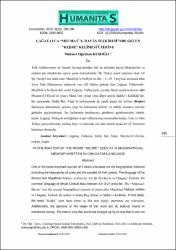| dc.contributor.author | Kuşoğlu, Mehmet Oğuzhan | |
| dc.date.accessioned | 2022-05-11T14:32:25Z | |
| dc.date.available | 2022-05-11T14:32:25Z | |
| dc.date.issued | 2020 | |
| dc.identifier.issn | 2147-088X | |
| dc.identifier.uri | https://doi.org/10.20304/humanitas.701584 | |
| dc.identifier.uri | https://app.trdizin.gov.tr/makale/TkRJMU9Ua3pNdz09 | |
| dc.identifier.uri | https://hdl.handle.net/20.500.11776/7528 | |
| dc.description.abstract | Türk Edebiyatının en önemli kaynaklarından biri de şâirlerin hayat hikâyelerini veonların şiir örneklerini içeren şuarâ tezkireleridir. İlk Türkçe şuarâ tezkiresi olan AlîŞîr Nevâyî’nin ünlü eseri Mecâlisü’n-Nefâyis’in dili, 15.-19. Yüzyıllar arasında OrtaAsya Türk Dünyasının müşterek yazı dili hâline gelmiş olan Çağatay Türkçesidir.Mecâlisü’n-Nefâyis’den sonra Çağatay Türkçesiyle yazılan ikinci şuarâ tezkiresi olanMecma‘ü’l-Havâs’ın yazarı Sâdık Bey Afşar veya diğer adıyla Sâdıkî-i Kitâbdâr’dır.Bu çalışmada, Sâdık Bey Afşar’ın tezkiresinde üç yerde geçen bir kelime (Ke?re)fazlasıyla dikkatimizi çekmiş olup bu kelimenin kökeni ve tahlili meselesi üzerinegörüşler paylaşılmıştır. Bu kelimenin tarafımızca gündeme getirilmesinin sebebi,hiçbir Çağatay Türkçesi sözlüğünde tespit edilememiş olmasından başka, Eski ve OrtaTürkçe periyodlarında, kelime başı ve ortasında var olan arkaik (eskicil) “?” foneminikorumuş olmasıdır. | en_US |
| dc.description.abstract | One of the most important sources of Turkish Literature are the biographical memoirs including the biographies of poets and the samples of their poems. The language of the famous text Majalisun-Nafayis written by Alî Şîr Nevâyî is in Chagatai Turkish, the common language of whole Central Asia between XV-XVI centuries. The “MajmaulHavas” was the second biographical memoir of poets after Majalisun-Nafayis written in Chagatai Turkish. Its author is Sadiq Beg Afshar or Sâdıkî-i Kitâbdâr. In this study, the word “Ke?re” seen three times in this text highly interested our relevance. Additionally, the opinions on the origin of this word and its analysis shared in mentioned survey. The reason why this word was brought up by us was that it was not detected in any Chagatai Turkish dictionary. Besides, the word preserved the archaic "?" phoneme existed in the Old and Middle Turkish, in the beginning and middle of the word. | en_US |
| dc.language.iso | tur | en_US |
| dc.identifier.doi | 10.20304/humanitas.701584 | |
| dc.rights | info:eu-repo/semantics/openAccess | en_US |
| dc.title | Çağatayca "Mecma'Ü'l-Havâs Tezkiresi"Nde Geçen "Ke?re" Kelimesi Üzerine | en_US |
| dc.title.alternative | In the Matter Of the Word "Kedre" Seen At a Biographical Memoir Written in Chagatai Language | en_US |
| dc.type | article | en_US |
| dc.relation.ispartof | Humanitas - Uluslararası Sosyal Bilimler Dergisi | en_US |
| dc.department | Fakülteler, Fen Edebiyat Fakültesi, Türk Dili ve Edebiyatı Bölümü | en_US |
| dc.identifier.volume | 8 | en_US |
| dc.identifier.issue | 16 | en_US |
| dc.identifier.startpage | 290 | en_US |
| dc.identifier.endpage | 298 | en_US |
| dc.institutionauthor | Kuşoğlu, Mehmet Oğuzhan | |
| dc.identifier.trdizinid | TkRJMU9Ua3pNdz09 | en_US |



















